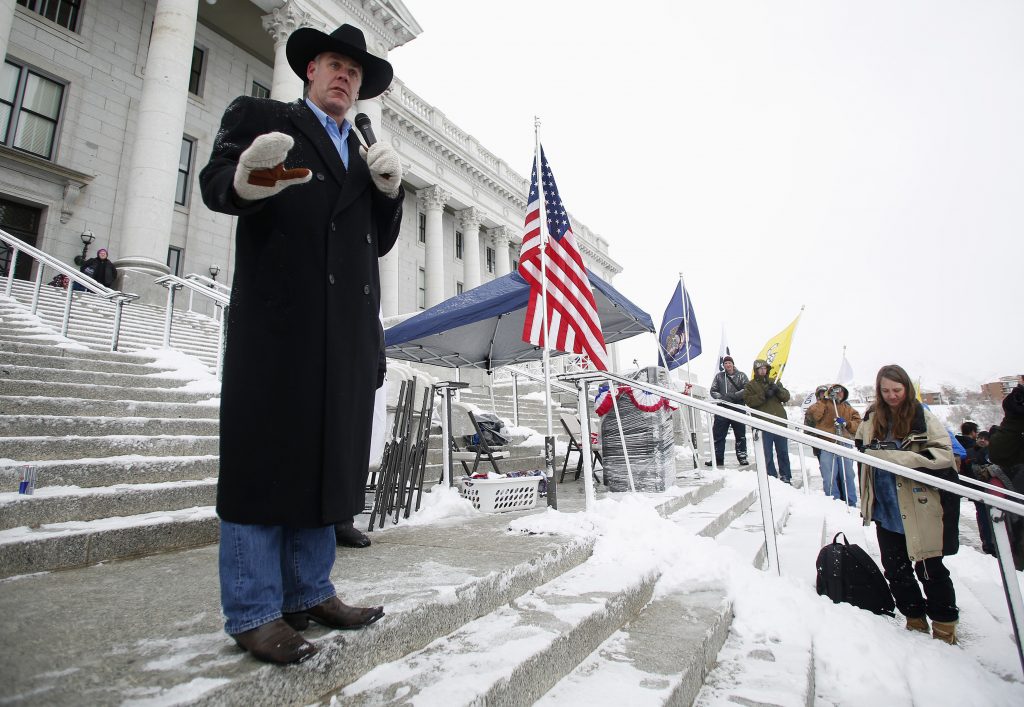Should Environmentalists Be Concerned? –

Montana state Senator Ryan Zinke addresses a pro-gun activist rally at the state Capitol in Salt Lake City, in 2013: Jim Urquhart/Reuters
By Glynn Wilson –
Americans who value national parks and other public lands have a right to be concerned about President Donald Trump’s pick to head the Department of the Interior, Ryan Zinke of Montana.
Zinke, whose record on protecting the environment shows some promise, but also potential problems, was sworn in as the 52nd Secretary of the Interior on March 1 after being confirmed by the U.S. Senate by a vote of 68-3. He is the first cabinet secretary from Montana and the first Navy SEAL in the cabinet.
In his acceptance announcement, Zinke pledged to live up to Teddy Roosevelt’s legacy of protecting public lands and to respect sovereign Indian Nations.
“I am honored and humbled to serve Montana and America as Secretary of the Interior,” Zinke said. “I shall faithfully uphold Teddy Roosevelt’s belief that our treasured public lands are ‘for the benefit and enjoyment of the people’ and will work tirelessly to ensure our public lands are managed and preserved in a way that benefits all Americans for generations to come.”
But he also said: “This means responsible natural resource development, increased access for recreation and sportsmen, and conservation that makes the land more valuable for our children’s children.”
When he nominated then-Congressman Zinke to his cabinet, President Donald Trump talked about making money off of public land, not protecting the national parks, forests and wilderness for future generations.
“Ryan has built one of the strongest track records on championing regulatory relief, forest management, responsible energy development and public land issues in Congress,” Trump said. “As a former Navy SEAL, he has incredible leadership skills and an attitude of doing whatever it takes to win. America is the most beautiful country in the world and he is going to help keep it that way with smart management of our federal lands. At the same time, my administration’s goal is to repeal bad regulations and use our natural resources to create jobs and wealth for the American people, and Ryan will explore every possibility for how we can safely and responsibly do that.”
In accepting the nomination, Zinke also talked about making money off of public lands, not protecting them for future generations.
“Our public lands can once again be economic engines for our nation by creating jobs in energy, recreation, and conservation,” Zinke said. “By working with President Trump and Congress to reevaluate and fix flawed regulations that are barriers to job creation, we will unleash the economic opportunity within our borders. Creating jobs on public lands can and will be done in an environmentally responsible way during my tenure.”
According to the New York Times and other media coverage of Zinke, he has indicated he is against the transfer of federal lands to the states, a move many Republicans in the West favor. In taking that position, he bucked some of his Republican colleagues who say Washington controls too much land in the West.
Notably, after federal land transfer was added to the Republican platform in 2016, Zinke resigned as a delegate to the party’s national convention. He has also campaigned for more money for the Land and Water Conservation Fund, which uses energy royalties to preserve outdoor space. In his nomination hearing, he even disputed Trump’s claim that climate change is a hoax.
“When my family and I have eaten lunch on Grinnell Glacier, the glacier has receded during lunch,” he said of Glacier National Park, where the number of ice sheets has dropped to 25 from 150 in 1850. “Climate is changing; man is an influence. I think where there’s debate on it is what that influence is, what we can do about it.”
Zinke’s critics say his idea of upholding Roosevelt’s legacy leaves something to be desired. He only gets a 4 percent lifetime score from the League of Conservation Voters. Oil and gas companies have donated about $350,000 to his campaigns. He is a strong supporter of coal, and has said, “we are not going to power our nation on pixie dust and hope.”
Zinke has also considered supporting a bill that would overhaul the Antiquities Act, the 1906 law signed by Roosevelt, by requiring approval from local residents before a president designates a national monument. On the first day of the 2017 Congressional session, he voted yes on package of bills that included a rule to make it easier for members of the new Congress to cede federal control of public lands to the states and private companies.
Republican Congress Moves to Privatize Public Land
As head of the Interior Department, Zinke faces important challenges and it is not clear how he can do much considering the Trump administration’s position to cut programs having to do with science and the environment. How will he deal with a $12.5 billion maintenance backlog in the nation’s national parks, for example, when the Trump administration’s fiscal blueprint calls for an 11 percent cut to the Interior Department’s $13 billion annual budget?
This White House is expected to push for more cuts at the Fish and Wildlife Service, which designates endangered species. And some Republican members of Congress are calling for the elimination of the the Department of Education and the Environmental Protection Agency.
While Zinke talks about respecting the rights of Native Americans, how will that play when the Trump administration has already crushed the Standing Rock Sioux Tribe’s protest of the Dakota Access Pipeline, while the Obama administration had it on hold to consider an alternative route?
Standing Rock Sioux Oil Pipeline Protest Comes to an End: Elections Matter
The Obama administration had also blocked oil and gas drilling off the coasts of Alaska and in the Atlantic, decisions Trump has promised to revisit.
According to coverage of Zinke’s nomination by Scientific American magazine, the question is whether he will walk the walk of Teddy Roosevelt, not just talk the talk.
“While he continues to paint himself as a modern Teddy Roosevelt, his very short voting record shows him repeatedly siding with industry,” says the Sierra Club’s Matthew Kirby, who works on western public lands issues.
Oil and gas organizations like the Western Energy Alliance and the Independent Petroleum Association of America applauded Zinke’s nomination, but conservation-minded hunting and fishing groups welcomed it, too.
“Zinke’s views on easing energy development on public lands seem largely in line with his party,” according to the magazine.
During his confirmation hearings, Zinke told Wyoming Republican Senator John Barrasso that he would support his effort to scrap a recently finalized Bureau of Land Management rule to limit methane waste from oil and gas drilling. Methane is a greenhouse gas as well as a source of energy, but it is often vented or burned as waste in drilling fields where the infrastructure does not exist to capture it and move it to market. The proposed rule would limit venting and flaring, and allow taxpayers to earn royalties on methane now treated as waste. Industry opposes the rule as unnecessary and expensive whereas environmental groups and the Obama administration have said it is common sense.
Peter Aengst, who works in Montana with the Wilderness Society, says the methane rule is one of the ways in which the Obama administration tried to modernize energy policy on public lands.
“The Trump administration has vowed to unravel those (reforms),” he says. “That’s where I think Ryan Zinke is probably most concerning for those of us who care about the wise management of our public lands.”
According to his Wikipedia page, Zinke signed a letter in 2010 calling global warming “a threat multiplier for instability in the most volatile regions of the world” and stating that “the clean energy and climate challenge is America’s new space race.” The letter spoke of “catastrophic” costs and “unprecedented economic consequences” that would result from failing to act on climate change and asked President Obama and Nancy Pelosi (then-Speaker of the House) to champion sweeping clean-energy and climate legislation.
But he has vacillated on the issue of climate change since, repeatedly expressed doubt about “anthropogenic (human caused) climate change.” In a debate in October 2014, Zinke said: “it’s not a hoax, but it’s not proven science either.”
During Senate confirmation hearings on his nomination as Secretary of the Interior, Zinke said that humans “influence” climate change, but did not acknowledge the scientific consensus that human activity is the dominant cause of climate change.
But then during the Republican primary when he was running for his one term in Congress, when the issue of abortion came up, Zinke attracted media attention for referring to Hillary Rodham Clinton as “the real enemy” and the “anti-Christ.” He received the endorsement of the Montana Right to Life Association.
While in Congress, Zinke supported the deployment of U.S. ground troops to combat ISIL, as well as ”abandoning” the Affordable Care Act, and cutting federal regulations. He supported a Republican effort to repeal the estate tax.
In the press release announcing his confirmation and swearing in, Zinke is touted as a fifth-generation Montanan who grew up in a logging and rail town near Glacier National Park.
“Zinke has had a lifelong appreciation for conserving America’s natural beauty while upholding Teddy Roosevelt’s vision of multiple-use on our public lands,” the release states. “He has consistently led the efforts to renew the Land and Water Conservation Fund in Congress, and has also been a firm advocate for our nation’s sportsmen and women to gain access to our public lands.”
Zinke co-authored the 2015 Resilient Federal Forest Act, which initiated new reforms for revitalizing America’s timber areas and preventing wildfires by emphasizing local collaboration on responsible timber harvest projects.
As Secretary of the Interior, Zinke leads an agency with more than 70,000 employees who serve as steward for 20 percent of the nation’s lands, including national parks, monuments and wildlife refuges. Of course the Trump administration has imposed a federal hiring freeze and a gag order on federal agencies to stop them from talking about science and the environment, especially global warming and climate change.
President Donald Trump Issues Media Blackout at Federal Agencies
The Interior Department oversees the “responsible development of conventional and renewable energy supplies on public lands and waters,” according to the release on Zinke, and is the largest supplier and manager of water in the 17 Western states.
It also upholds “trust responsibilities” to the 567 federally recognized American Indian tribes and Alaska Natives.
Zinke represented the state of Montana in the U.S. House of Representatives from 2014-2017 before taking over at Interior. Before being elected to that position, Zinke served in the Montana State Senate from 2009 to 2011. Before that, Zinke’s served for 23 years in the Navy SEALs after enlisting in the Navy in 1985.
Zinke holds a Geology degree from the University of Oregon, where he was an All-PAC 10 football player. He also holds a Master’s degree in Business Finance from National University and a Master’s degree in Global Leadership from the University of San Diego. He also claims to be a proud adopted member of the Assiniboine Sioux Tribe at the Fort Peck Reservation in Northeast Montana.














I don’t really think – at this point- that what this individual thinks. Trump will dictate, period.
It’s still important to know what we can about this guy, and this is the best story in the country on that. Surely that has some value in the Age of Facebook.